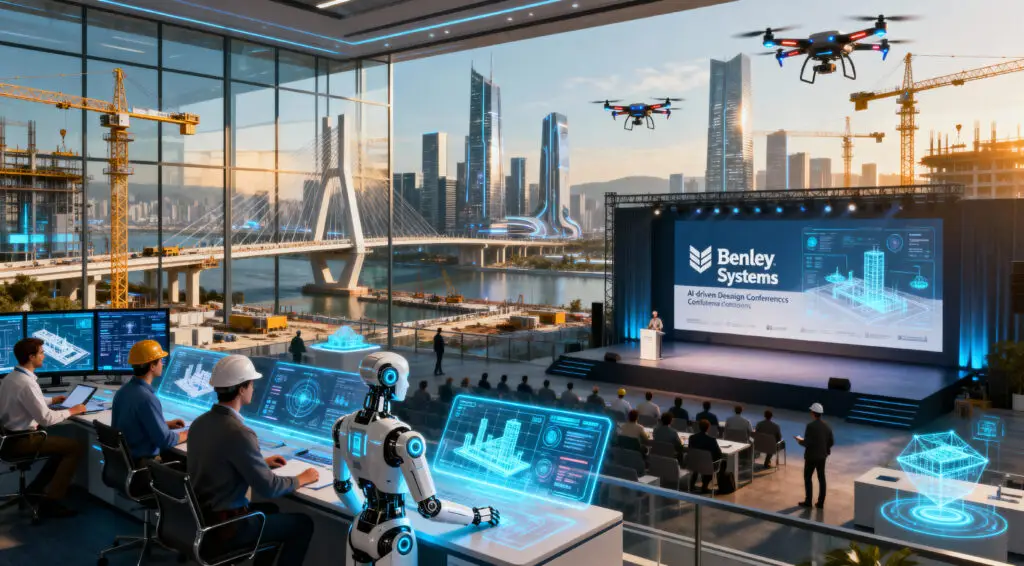AI Ushers in a New Era of Infrastructure Efficiency
Artificial intelligence is redefining how the world builds, maintains, and manages infrastructure. From design precision to operational oversight, AI-driven systems are enabling faster, smarter, and more adaptive project execution.
At the 2025 “Year in Infrastructure” conference in Amsterdam, global experts underscored how AI is becoming the cornerstone of engineering innovation. Their message was clear — embracing AI is no longer optional; it is essential for achieving sustainability and efficiency in a rapidly urbanizing world.
Bentley Systems Leads the Charge in Infrastructure AI
Bentley Systems CEO Nicholas Cumins opened the conference by outlining a bold vision for the future of infrastructure technology. He emphasized that AI should serve as an empowering force rather than a replacement for human creativity.
Cumins noted that the shortage of qualified engineers worldwide is a pressing issue, and AI can help close that gap by improving productivity. “Trustworthy AI, built on real-world context, will reshape engineering workflows,” he said, framing AI as both an innovation tool and a capacity multiplier.
Bridging the Global Engineering Capacity Gap
The growing shortage of skilled engineers has long hindered infrastructure development. AI is emerging as the key solution, automating repetitive tasks while assisting professionals in critical decision-making. Bentley’s leaders argue that AI can help bridge global engineering gaps by enabling precision modeling, real-time monitoring, and automated project updates.
With generative AI tools like OpenSite+ delivering civil design projects up to ten times faster, engineers can focus on creativity while letting algorithms handle complex calculations and simulations.
Recommended Article: AI Disruption and Policy Uncertainty Leave Young Tech Workers Struggling
The Rise of Context-Aware AI in Construction
AI’s potential in infrastructure is most evident in context-aware applications like Bentley Copilot, an AI assistant that guides engineers through workflows and model adjustments. These tools integrate real-world data from sensors, digital twins, and environmental systems to deliver insights during design and construction phases.
The integration of Bentley’s AI technologies shows how automation can transform infrastructure from a static process into a dynamic, adaptive system — one capable of predicting maintenance needs and optimizing resource use before problems occur.
Bentley Infrastructure Cloud Connect Enhances Data Integration
Chief Technology Officer Julien Moutte introduced Bentley Infrastructure Cloud Connect, a new platform that unifies fragmented engineering data into a single, contextual environment. Moutte explained that infrastructure data exists across models, documents, and IoT sensors — but rarely connects effectively. The new platform bridges that gap by centralizing information from over fifty file formats, offering seamless integration between engineering, geospatial, and operational systems. This connected data ecosystem marks a major step toward real-time collaboration and transparency across global infrastructure projects.
AI Expands Into Reality Modeling and Utility Design
Bentley’s Chief Platform Officer, Patrick Cozzi, highlighted how AI-driven geospatial systems are reshaping reality modeling and digital twins. Integrating Cesium’s 3D visualization capabilities into design tools allows engineers to work with photorealistic models of cities and terrain. These advancements enable planning and monitoring at unprecedented detail and speed.
Additionally, Bentley announced AI-powered enhancements to utility infrastructure, including OpenUtilities Substation+, a tool that integrates automation into power system design, launching in late 2025.
Building Trust in AI Through Data Governance
As AI becomes central to infrastructure, data ethics and transparency have become top priorities. Cumins reaffirmed Bentley’s commitment to protecting user data, stating that clients retain full control over how their data is used in AI training.
The company introduced a Data Agreement Registry to ensure transparency and consent in all data-driven operations. This governance model underscores that responsible AI is not just about innovation — it is about trust, stewardship, and partnership between technology providers and engineers.























